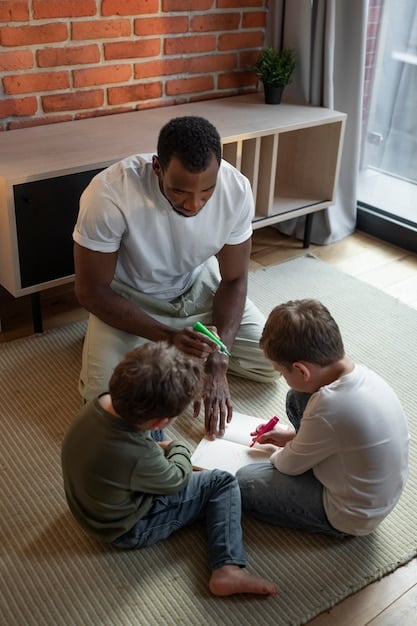Effective Communication for Single Dads: Build Trust & Resolve Conflicts

Effective communication strategies for single fathers are crucial for resolving conflicts and fostering trust with their children, ensuring a healthy and supportive family environment.
Being a single father presents unique challenges, especially when it comes to communication. Mastering effective communication strategies for single fathers; resolving conflicts and building trust with your children can transform your relationship, creating a more supportive and understanding family dynamic.
Understanding the Communication Challenges Faced by Single Fathers
Single fathers often navigate a complex landscape of responsibilities, which can impact their communication style. Understanding these challenges is the first step toward building stronger relationships with their children.
Juggling work, household chores, and parenting duties leaves less time and energy for meaningful conversations. This scarcity of time can lead to hurried or superficial interactions, potentially missing opportunities for deeper connection and understanding. Single fathers face the added pressure of being both a mother and a father figure, which can create emotional stress that affects how they communicate.
Common Communication Barriers
Several barriers can hinder effective communication. It’s important for single fathers to recognize these and actively work to overcome them.
- Lack of Time: Limited time due to work and household responsibilities.
- Emotional Stress: The pressure of fulfilling multiple roles.
- Guilt and Overcompensation: Feeling guilty about the family situation and overcompensating with material gifts instead of meaningful conversations.
- Difficulty Expressing Emotions: Societal expectations that men should be stoic can make it hard to express feelings.
By identifying these common barriers, single fathers can be more mindful of their communication patterns and take steps to improve them, fostering a more supportive environment for their children.

Active Listening: A Foundation for Trust
Active listening is more than just hearing words; it’s about fully understanding and empathizing with your child’s perspective. This skill is essential for single fathers aiming to build a foundation of trust and open communication.
When you actively listen, you show your child that their thoughts and feelings matter. This validation encourages them to share more openly, strengthening your bond. It involves paying attention to both verbal and non-verbal cues, such as body language and tone of voice. By noticing these cues, you can gain deeper insights into what your child is truly feeling, even if they struggle to express it directly. Active listening also requires a high level of empathy.
Techniques for Active Listening
Here are some techniques that can help single fathers practice active listening and improve their communication skills:
- Pay Attention: Give your child your undivided attention by minimizing distractions.
- Show That You’re Listening: Use verbal and non-verbal cues, such as nodding and saying “I understand.”
- Provide Feedback: Paraphrase or summarize what your child has said to ensure you understand correctly.
- Defer Judgment: Listen without interrupting or criticizing.
By incorporating these techniques into your daily interactions, you can create a more supportive and understanding environment for your children, fostering a deeper connection based on trust and empathy.
Creating Open and Honest Dialogue
Open and honest dialogue is the backbone of any healthy relationship, especially between single fathers and their children. Establishing this kind of communication requires intentional effort and a willingness to be vulnerable.
Creating a safe space where your children feel comfortable sharing their thoughts and feelings without fear of judgment or punishment will foster a strong connection. Honest conversations build trust, allowing you and your children to navigate challenges together. Encouraging your children to express their emotions, both positive and negative, helps them develop emotional intelligence and resilience.

Strategies for Encouraging Open Dialogue
To promote open and honest dialogue, single fathers can implement several practical strategies that make it easier for children to share their thoughts and feelings.
- Schedule Regular Check-Ins: Dedicate specific times for conversations, such as during dinner or before bedtime.
- Ask Open-Ended Questions: Encourage detailed responses by asking questions that can’t be answered with a simple “yes” or “no.”
- Share Your Own Experiences: Be willing to share your own feelings and challenges to create a more balanced and relatable dynamic.
- Validate Their Feelings: Acknowledge and validate your children’s emotions, even if you don’t agree with their perspective.
By incorporating these strategies, you can encourage your children to open up, leading to deeper understanding and stronger relationships within your family.
Conflict Resolution Skills: A Pathway to Understanding
Conflict is a natural part of any relationship, but it’s especially important for single fathers to develop healthy conflict resolution skills. These skills not only help in resolving disagreements but also in teaching children how to manage their own conflicts effectively.
Approaching conflicts with empathy and a willingness to understand your child’s perspective can prevent escalating arguments. Finding mutually agreeable solutions fosters a sense of fairness and collaboration. By modeling effective conflict resolution, you equip your children with valuable life skills that they can use in all their relationships.
Steps to Effective Conflict Resolution
Effective conflict resolution involves several key steps that can help single fathers navigate disagreements constructively.
- Stay Calm: Maintain a calm demeanor to prevent the situation from escalating.
- Identify the Issue: Clearly define the problem and the underlying needs of both parties.
- Listen Empathetically: Understand your child’s perspective and validate their feelings.
- Brainstorm Solutions: Work together to generate possible solutions.
By mastering these steps, you can transform conflicts into opportunities for growth and connection, teaching your children valuable skills along the way.
Building Trust Through Consistency and Reliability
Trust is earned through consistent actions and reliable behavior. For single fathers, being consistent and reliable is essential for building a strong and trusting relationship with their children.
When you follow through on your promises, your children learn that they can depend on you. This consistency provides a sense of security and stability, particularly important in the often-unpredictable lives of children from single-parent households. Showing reliability demonstrates that you value your children’s needs and are committed to their well-being. It reinforces the idea that you are a safe and dependable figure in their lives.
How to Show Consistency and Reliability
There are multiple ways that single fathers can demonstrate consistency and reliability in their daily interactions with their children, which will foster trust and strengthen family bonds:
- Keep Promises: Fulfill your commitments, big or small, to show that your word is trustworthy.
- Be Punctual: Arrive on time for appointments and events to demonstrate respect for their time.
- Provide Stability: Maintain a stable home environment, even during challenging times.
- Be Present: Be fully engaged and attentive when spending time with your children.
By prioritizing consistency and reliability, you can reassure your children that they are valued and supported, building a foundation of trust that will last a lifetime.
The Importance of Self-Care for Effective Communication
Self-care is not selfish; it’s essential for single fathers to take care of their own well-being in order to be effective communicators. When you prioritize self-care, you have more emotional and mental resources to support your children.
Taking care of your physical and emotional health allows you to approach parenting with patience and empathy. When you are rested and centered, you are less likely to react impulsively or emotionally to challenging situations. Prioritizing self-care sets a positive example for your children, teaching them the importance of looking after their own well-being. They learn to recognize and respect the need for personal boundaries and healthy coping mechanisms.
Practical Self-Care Tips for Single Fathers
Single fathers can incorporate several practical self-care tips into their routines to maintain their well-being. These simple actions can have a significant impact on both their physical and mental health, leading to better communication with their children.
- Schedule Regular Exercise: Physical activity can reduce stress and improve overall mood.
- Get Enough Sleep: Aim for 7-8 hours of sleep each night to maintain optimal energy levels.
- Practice Mindfulness: Mindfulness can help reduce stress and improve focus.
- Seek Support: Connect with friends, family, or a therapist for emotional support.
By integrating these self-care practices into your routine, you can ensure that you have the emotional and mental resources needed to communicate effectively with your children, fostering a healthier and more supportive family environment.
| Key Point | Brief Description |
|---|---|
| 👂 Active Listening | Truly hearing your child to build trust. |
| 🗣️ Open Dialogue | Creating a safe space to share feelings. |
| 🤝 Conflict Resolution | Healthy ways to handle disagreements. |
| 📅 Consistency | Being reliable to foster security. |
Frequently Asked Questions
▼
Focus fully on what your child is saying, both verbally and nonverbally. Make eye contact, nod, and summarize their points to show you understand. Avoid interrupting or thinking about your response while they’re talking.
▼
Try questions like, “How did that make you feel?” or “Tell me more about…” These types of questions prompt your child to share more than a simple “yes” or “no” and encourage them to explore their thoughts and feelings.
▼
Practice deep breathing to help manage your emotions, and take a break if needed. Focus on understanding your child’s perspective instead of immediately reacting. Remember, staying calm sets a positive example for your child.
▼
Consistency builds trust and provides a sense of security. When you consistently follow through on promises and maintain routines, your child knows they can rely on you, which reduces anxiety and strengthens your bond.
▼
It’s okay to start small. Try sharing simple feelings like “I’m feeling stressed” or “I’m proud of you.” Modeling emotional expression allows your child to feel more comfortable sharing their own emotions as well.
Conclusion
Effective communication is the cornerstone of a strong and trusting relationship between single fathers and their children. By actively listening, fostering open dialogue, developing conflict resolution skills, and prioritizing consistency, single fathers can create a supportive and understanding family environment that nurtures their children’s emotional well-being.





